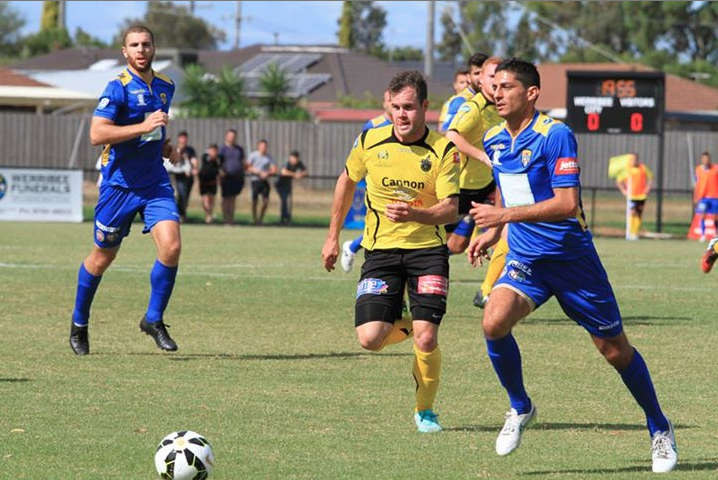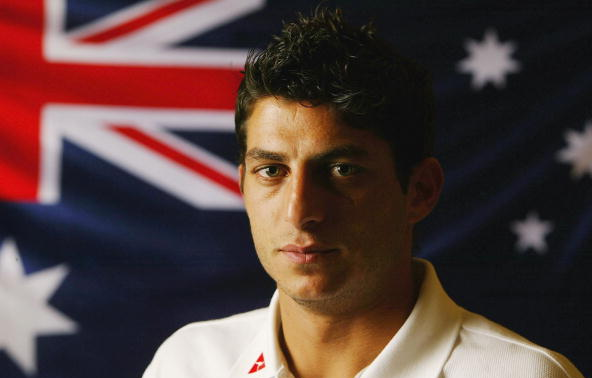At 36-years-old, one would be forgiven for thinking Simon Colosimo is enjoying a well-earned break from football, working on the next chapter of his career after almost twenty years in the game. But the former Socceroo still turns out on the pitch for the unfashionable Werribee City, using his smarts and experience to try help the Bees dodge relegation for the second time in the NPL.
The two-time Joe Marston Medallist made his senior debut in 1997, experiencing a fair share of highs and notable lows in a career spanning a number of youth and senior Socceroo caps, along with a horrific injury inflicted by Manchester United’s Andy Cole – all of which he reflects upon with few regrets.
The beginning
Colosimo’s football journey began in the 1980’s, kicking a ball around with family and friends in Melbourne’s northern suburbs.
“I found my love for the game through the community, which involved me watching our local club Thomastown play every weekend,” Colosimo recalls.
“Funnily enough when I was a kid I used to watch [former coach] Nino [Ragusa] play for Thomastown, as well as Christopher Cristaldo’s father Vic, and to this day I remember those times fondly.”
In 1996, Colosimo made the move away from his home to Canberra, spending a year at the Australian Institute of Sport, which he describes as “the most enjoyable and important year of my football”. He graduated alongside future Socceroos Brett Emerton, Vince Grella, Mile Strejovski and Mark Bresciano, moving backed to Melbourne to sign with Carlton, who were embarking on their inaugural campaign in the National Soccer League (NSL).
Colosimo excelled at Princess Park under the tutelage of both Eddie Krncevic and Stuart Munro, flourishing in a squad bursting with fellow young talents Grella, Bresciano, and later Archie Thompson and Joshua Kennedy.
“Those years at Carlton were great times, particularly as some of us had gone through the national youth set-up and then went into a dressing room with the likes of Andrew Marth, John Markovski, Lubo Lapsansky and Dean Anastasiadis to name a few,” Colosimo says.
“They were all being great role models to us, and something I hoped that I emulated later on in my career”.
His performances at Princes Park attracted strong overseas interest with the likes of European heavyweights Bayern Munich and Panathinaikos showing interest in the former central-midfielder.
The Andy Cole incident
With the world seemingly as his feet, Colosimo’s career took a turn for the worse in 1999. Playing for the Socceroos in a friendly against reigning European Champions Manchester United, the 20-year-old fell victim to a fierce challenge from United striker Andy Cole that severely damaged his knee and forced to him to miss most of the 1999-2000 season.
“It is what it is,” Colosimo reflects on the career-altering setback.
“I was disappointed for only the first week before realising that football was what I wanted to do for the rest of my life, the precarious nature of such a career and in essence made me more determined from then on.”
“From that moment I learned to take nothing for granted as you’re there one minute, with interest from Europe and playing for the national side, and then next minute on the sidelines for a lengthy period of time due to one injury.”
Despite the long injury layoff, Colosimo returned to action and immediately made an impact for Carlton, scoring in a local derby against South Melbourne – who would become his employers after the demise of Carlton in late 2000. Colosimo also returned in time to feature for the Olyroos as the team embarked on an Olympic campaign on home soil. The first group stage bore particular significance to the Colosimo, as the Olyroos opening group-stage game was against Italy at a sold-out MCG, with Andrea Pirlo’s late goal securing a 1-0 victory for the Italians.
“The best moment of that for me was my family in Italy sitting in the bars wearing Aussie jerseys. Those sort of moments showed me that we’re such a multicultural sport, bringing guys from so many different backgrounds together in a team and I think that shows with our distinct style of play,” he says.
Europe
Once again fit and raring to go, Colosimo enjoyed a stint at South Melbourne under Mike Peterson, before finally earned a European deal with Manchester City in 2001.
“The move to Manchester City was sealed pretty early on, so my time at South Melbourne more came about due the fact that Carlton went bust and I needed to play a bit before going over to England,” he says.
“I had a great time at South amongst some wonderful players like Con Boutsianis, Goran Lozanovski, Michael Curcija, Vaughan Coveny, Paul Trimboli and one of my best mates in football, our goalkeeper Michael Petkovic. You build friendships in football and every one of those guys is still somehow involved in the game these days and they all have that aim of helping the game grow and get better.”
In Manchester, Colosimo spent a season under Kevin Keegan as the Sky Blues secured promotion back to the Premier League. However, the Socceroo was restricted to just six league appearances before departing for a spell in Belgium with Royal Antwerp.
“In hindsight, I probably should have done the move the opposite way around by going to a lower-level European league first,” he admits.
“I enjoyed my time at Manchester City and having seen the support they had first-hand, I’d have to say that even back then they were a big club, let alone now. Watching the Premier League over the years, I’ve generally always supported the teams which contained Aussies but Manchester City is my number one team purely off the back of my time spent at Maine Road.”
Back to the NSL, Asia, World Cup snub
Colosimo returned to Australia in 2002, winning an NSL title with the Perth Glory before falling short at the final hurdle a year later with the Parramatta Power, ironically losing the Grand Final to his former club in the last ever NSL game.
“The football and players were excellent but the game wasn’t quite there as there was no commercial nor any government support,” Colosimo says.
“There was a lot of passion in and around the changing rooms, Perth themselves did a great job, particularly Chairman Nick Tana, who was instrumental in bringing about what later became the A-League.”
Colosimo himself joined an exodus of Australian stars that went to Malaysia and enjoyed a successful time at Pahang FA, where he helped the side win the Championship alongside Socceroos teammate Ante Milicic.
“For the players themselves, the year in between the end of the NSL and the onset of the A-League was a difficult period,” he says.
His time in Malaysia allowed him to keep fit ahead of the 2005 Confederations Cup in Germany, where the Socceroos finished bottom of their group – despite troubling the hosts and Argentina – culminating in the resignation of Frank Farina as national team coach. With new manager Guus Hiddink at the helm, Colosimo was not called up to the Socceroos side that broke a 32-year World Cup drought, a decision he conceded came down to his inability to secure a European move at the time.
“If you look at the team that went there, 95% were playing first-team European football week-in, week-out,” he says.
A-League
At club level, Colosimo spent the next three years back at the Perth Glory, as the former NSL powerhouse struggled to replicate its past success in the A-League.
“In that first year we were pretty competitive under Steve McMahon but struggled to turn our domination into results, but I’m sure that the Glory will once again be up there and competing for titles in years to come,” Colosimo says.
A loan spell in Turkey with Sivasspor followed for the Glory Captain in 2007, where he linked up with former teammate and friend Michael Petkovic, before moving back to the East Coast of Australia in 2008 and signing for Sydney FC.
The Sky Blues struggled for results and consistency in his first year at the club, with Colosimo spending most of his time on the sidelines, as the board lost patience with coach John Kosmina and replaced him with the relatively unproven Czech manager Viteslav Lavicka.
The second season proved to be a much different story as Colosimo thrived in a centre-back role, helping the club beating Melbourne Victory on penalties in the 2010 A-League Grand Final. His performance earned him a second career Joe Marston Medal.
“I had a tough first year which included cutting my season short to go and have an operation, but the decision was made with the second season in sight in order for me to get back on the park on the first-day of pre-season training,” he says.
“Then the year under Viteslav, what a great time, what an absolute gentleman he was in terms of the respect he had for every single one of us. I can’t speak any more highly of him, that’s how good he was to us. It was a wonderful time of my career, playing with the likes of John Aloisi, Steve Corica, Clint Bolton, Alex Brosque, Mark Bridge and others, and one I have very fond memories of.”
At the time, Colosimo was in career best form as one of the A-League’s stand-out defenders, with calls for him to be included in Pim Verbeek’s World Cup Squad. However, a proposed move to Korean giants FC Seoul at the conclusion of the A-League season in March fell through, leaving Colosimo out of action in the months leading up to the tournament and ultimately crippling his squad selection chances.
“So many things happen in the process of a player transfer and I’ve never been one to look back on things like that, as it wasn’t in my control, and at the end it is what it is,” he says.
“If you start thinking like that and blaming others for that injury, or that moment and so on you tend to never get over it and fail to move on.”
Instead of moving to Korea, Colosimo, along with then Sydney teammates Aloisi and Bolton, moved back to Melbourne to captain Melbourne Heart in its inaugural season, a move that he describes as “the greatest moment of my football career.”
“Having the chance to captain my home-team club and having my son walk out with me onto the new stadium (AAMI Park) in the first game of the season was, and is, the greatest moment of my career,” he says.
“Don’t get me wrong, representing Australia is the greatest thing you’ll do as an athlete, but as a person, a father and from a personal point of view it was that moment.”
On the pitch, Heart underachieved in their first three years in the competition, with Colosimo describing the months leading up to his departure from Melbourne as the point where he wasn’t really enjoying the game, feeling it was merely becoming a job for him.
“At that point I was going to give the game up but my wife insisted that I must not leave the game at a point where I wasn’t enjoying it,” he says.
India and the State Leagues
A surprise move to India followed, where Colosimo signed for Arthur Papas’ Dempo and lived together with fellow Aussie Matthew Foschini, who was plying his trade locally for Salgaocar.
“I had known Arthur Papas from his time at the Heart where he coached the youth side and he asked me to come to India where he said that I would enjoy the game,” he says.
“I re-discovered my love for the game in India and had I not gone there I would not be playing in the NPL.”
Colosimo moved to the Goulburn Valley Suns in mid-2014, answering the call of his former Heart teammate Peter Zois, who at the time was managing the club. However, Zois was sacked from his position soon after the deal was confirmed, leaving the veteran centre-back in two minds as to whether he should honour the transfer.
“I made the decision to continue as I committed myself to the people at the club who were great people and didn’t want to let them down,” he says.
Upon the Suns relegation from the NPL, Colosimo moved to Werribee City after Papas recommended Nino Ragusa to him, a coach he describes as “a great tactician who brings a different dynamic to the game and one who will challenge you”. An added factor for his decision to head to Galvin Park was his history of watching Ragusa play at Thomastown. Colosimo is full of praise for the club staff – even in the absence of the departed Ragusa – who are “trying to take the club places,” and admits he is once more enjoying his football at the Bees despite them being locked in a relegation dog-fight.

***
With Simon Colosimo’s playing career in its twilight, the loyal servant to Australian football has no plans to completely give up the game he loves. He’s involved in the PFA as a player relations manager and is giving back to grassroots at Galvin Park. He remains unfazed by the tackle that put him out of the game so long at such a young age, instead reflecting positively on the journey he would have not otherwise experienced if it weren’t for football.

